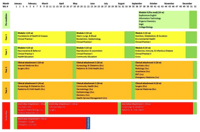
Photo from wikipedia
An analysis of textbooks can lead to a comparison of the curricula in two nations and how curriculum standards determine the textbook content in a developed and developing country. Deductive… Click to show full abstract
An analysis of textbooks can lead to a comparison of the curricula in two nations and how curriculum standards determine the textbook content in a developed and developing country. Deductive content analysis was employed to analyze and compare objectives mandated in science curricula in Myanmar and Japan, and the articulation of science textbooks’ content on science curricula’s objectives including approaches to learning and learning of content taught at grade-6 in Myanmar and grade-7 in Japan. The results show that both countries’ curriculum objectives are clearly mandated to cultivate students’ scientific knowledge, skills, and attitudes. The exchanges of knowledge between the two contexts are the analyzed Japanese science textbook’s employment of a step-by-step and detailed scientific inquiry-based approach for the students to learn light and sound concept, and Myanmar’s science textbook’s description of some technical scientific terms in both mother tongue (Burmese) and English.
Journal Title: Eurasia Journal of Mathematics, Science and Technology Education
Year Published: 2023
Link to full text (if available)
Share on Social Media: Sign Up to like & get
recommendations!